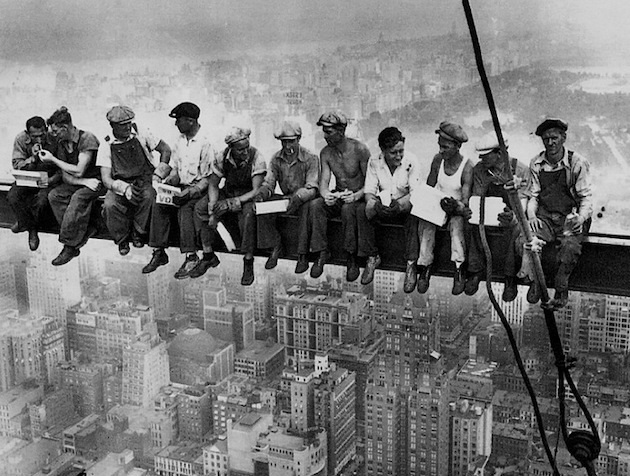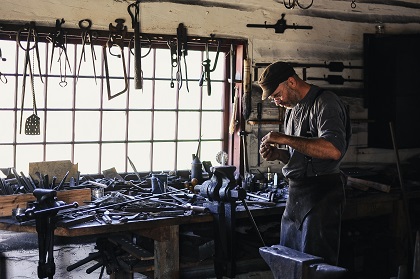God has given a certain dignity to work, making it something that we cannot live without. However, if we look to our work to find meaning in life, we will end up with an empty heart.
 Lunch atop a Skyscraper, 1932, New York Herald-Tribune. / Wikipedia, CC
Lunch atop a Skyscraper, 1932, New York Herald-Tribune. / Wikipedia, CC
William James famously said that “[n]othing is really work unless you would rather be doing something else”. Why work then? Most people will say that it is because they need to make a living. Others work because they want to amount to something in life, on the rationale that if you don’t have a good job, you are nothing. Few people will say that they enjoy their work, but most people see it as a necessity.
In the past, work was only seen in terms of manual labour. The ancient Greeks said that science and sport were not work. Work was what slaves did. Nowadays, it is seen in a different light, even though the connotations of drudgery sometimes persist. The Argentinian comedy-musical group Les Luthiers – well-loved in the Spanish speaking world – once said that “slavery hasn’t been abolished, it has only been organized into eight-hour working days”. In Latin America – where Roman Catholic tradition has influenced secular thinking – the idea of work as a Biblical curse is particularly strong. In a more general sense, many see it simply as a kind of punishment.
Although we obviously need it in order to survive, work is much more than that. It carries a certain dignity and our self-esteem and personal value are closely linked to it. Freud believed that love and work were the two main activities that gave life meaning. A person’s job provides them with a personal identity and status, and influences the way that others see them. Work has a social meaning, which goes beyond an economic need. This can be seen in the way that unemployment can affect a persons’ sense of worth. Work gives a sense of purpose in life which is about more than just productive capacity.
CREATION AND THE CULTURAL MANDATE
In the beginning...it was God who started to work. The concept of work in the Bible begins with God’s creation. His work isn’t so much about effort, but more about play and creativity, as in art. He is presented to us as a cosmic gardener, who in Eden reveals Himself to be a careful craftsman, whose heavens declare the work of his fingers (Psalms 19:1; 8:3). This work was voluntary. He did it because he wanted to. It was part of his plan, consistent with his nature. He worked for six days and on the seventh he rested from his work. He then judged his work to be good.
Although he creates things like a craftsman, he orders and names them like a zoologist. He carries out his work according to a plan, examining the quality of his work at each stage, like a good artist or a responsible manufacturer. He assigns clear functions to the components of His creation, like a good engineer. He clearly defines humanity’s role and provides the necessary resources, like a good manager. His creation is a reflection of who He is and He creates humanity in his image. God is pleased with his creation and when it is finished he says that it is “good”.
 Photo: Unsplash, CC0
Photo: Unsplash, CC0God also gives humanity work. When he creates the first man and the first woman, God blesses them and, as part of that blessing, he tells them to “be fruitful and increase in number; fill the earth and subdue it” (Genesis 1:26–8). This has often been called the cultural or creation mandate (repeated in Genesis 2:15). It includes much more than work, but it is in terms of that commandment that we should understand the biblical meaning of work. It is a commandment for humanity, seen as the culmination of the creation of heaven and earth. It is as if what God does on the sixth day isn’t just another thing on the list, but the very meaning of creation. This commandment reveals God’s purpose in creating Man.
Not only the moment, but also the way in which God creates Man, is significant. On the sixth day he reveals his plans for the first time (v. 26) and we see how he puts them into action (28). His idea is to make humanity in his “image and likeness”, to “rule” over creation. It is as if human activity were a continuation of God’s creative activity. That is more than a commandment! In making us administrators of the earth He didn’t give us precise instructions after creating us, but He charged us with filling and taking care of it. That is part of the reason for which we were created. It is part of our identity.
God has given a certain dignity to work, without which we cannot live. The Bible does not see it as a punishment, but as part of God’s purpose for human life. When humanity rebelled against God, the nature of work changed. It would no longer be easy. After the fall, it would require toil and effort (Genesis 3:17–19), causing a feeling of frustration and futility (Ecclesiastes 2:22–23), but carrying a dignity that stretches to all human activity. It shows us something of what it means to be made in God’s image, despite our sinful nature. In the New Testament, that image is related to justice, sanctity and knowledge, but Genesis refers to ruling over the world, empowering Man to shape and care for God’s creation.
Genesis describes how humanity responds to that commandment – the manifestation of God’s image. The man and the woman fail (3:6), they are thrown out of Eden (3:23); cities grow up (4:17); it is the start of pastoral work and nomadic movements (4:20), music (4:21) and metal work (4:22). Some, like Noah (9:7), respond obediently to the commandment, while others, like Cain, rebel. Meanwhile, Adam continues to work the land and Eve gives birth to new generations. Humanity cannot stop trying to fulfil its purpose, all the while perverting it, because that is how God has made it. There is no other way of surviving. Even when God drowns the earth, he saves a remnant, which, together with Noah, begins to work the land again (9:20) and fill it with its children (v. 19).
THE NEW CREATION IN CHRIST
Jesus renews God’s mandate by being the perfect model of the true Man, made in God’s image to rule over the world. The gospels present him as a manual labourer, working as a carpenter until the age of 30. He describes what he has to do (John 4:34; 5:17; 9:4) as unique work; a true model of creativity, order and construction, benefitting Man and the rest of creation. The work of redemption is a new creation, which restores and liberates an old creation that is subjected to vanity by sin (Romans 8:19–20).
Salvation is however much more than the restoration of Eden. God is reconciled with His people, not in a garden, but in a city. We are not returning to the garden of Paradise but to a new Jerusalem (Revelation 21:21), which descends from Heaven to become the city of men; the result of human culture in the City of God.
That which started with sin, is perfected, like the leaves on Eve’s fig tree, to become the dress of a “bride beautifully dressed for her husband” (21:2). There is a culmination to creation in History where the “reigns of the world” come to be “of our Lord and his Messiah” (11:15).
 Photo: Unsplash, CC0
Photo: Unsplash, CC0The Christian is thus made a steward of the Earth. Nature is not just merely the backdrop for the story of salvation. This innate significance has been forgotten by modern theology, which emphasizes the acts of God in History over God’s purpose in creation. We need to take care of this creation, but also work in it.
The Scriptures are full of praise for the work of our hands, hearts and minds. The skills needed for work are described as “gifts of God” in Exodus 35:30–32, but the Jesus’ ministry also develops in the context of work. The carpenter talks about sowers (Matthew 13:3), harvesters (13:30), builders (7:24), fishermen (Luke 15:1) and women that sweep their homes (15:8).
Paul does not allow for idleness and exhorts Christians to work (2 Thessalonians 3:10). “Anyone who has been stealing must steal no longer, but must work, doing something useful with their own hands.” (Ephesians 4:28). “You should mind your own business and work with your hands, just as we told you, so that your daily life may win the respect of outsiders and so that you will not be dependent on anybody” (1 Thessalonians 4:11–12).
The word used in the New Testament does not distinguish between physical and spiritual work. When the apostle talks about the manual work with which he earned a living, he uses the same term as for his apostolic service (1 Corinthians 4:12; 15:10; 16:16; Galatians 4:11; Philippians 2:16; Colossians 1:29; 1 Thessalonians 5:12). It is sometimes even hard to know what he is referring to. All work is born out of faith and serves God. Those of us who are new creatures are restored in Christ with the image of God to work in the world, providing for the needs of others (Acts 20:35; 2 Corinthians 11:9).
Paul himself worked with his hands, so as not to be a burden on the church but rather help others. He thus set an example “nor did we eat anyone’s food without paying for it. On the contrary, we worked night and day, labouring and toiling so that we would not be a burden to any of you” (2 Thessalonians 3:10). While he cared about the poor and collected donations for them, he could not stand the idle. The church is a place of work.
His advice to slaves is that they should work with enthusiasm as slaves of Christ. This means considering even the work of a slave as a service for God, comparable to his apostolic mission. This idea is clearly opposed to the view taken by the Greeks. For them, work was something peripheral to the real concerns of humanity. For Paul, religion wasn’t a spiritual activity that was separate from work, but he instead believed that all aspects of life provided an opportunity to serve God with love.
Ecclesiastes 5:19–20 says that being content with our work is a “gift of God”, which brings “gladness of heart”, even though it is “toilsome labour under the sun” (v. 18). It is a legitimate source of satisfaction, ordained by God as part of the human condition. Work is therefore not a human but a divine concept.
THE LIMITS OF WORK
On the other hand, work isn’t the means of salvation. It cannot absolve of sin, or produce a new creation. We cannot obtain happiness through work, nor security or control of our human world.
That is the experience presented in Ecclesiastes 2:10–11: work has no intrinsic value. If we look for meaning in our life through work, we will end up with an empty heart. Our value is related to the creator of work. Exodus and Deuteronomy put work in perspective and establish clear limits in the time that we should spend working. The seventh day is the Sabbath, a day of rest. We should recognize God as the Creator and rest in him, also letting others rest.
God is the Master of time and time is a gift from God. On the seventh day He commanded the Israelites to leave time – that precious commodity – in his hands. We should resist the temptation to break with the rhythm of work and rest that God has established. Even God rested after having created the world. The commandment to rest on the Sabbath is as important as the commandment against stealing or killing. The rhythm in Israel’s life was set by both work and rest.
As creatures made in God’s image, we are called to do more than just work. We are also called upon to be good husbands, wives, parents, sons and daughters, neighbours and citizens. We need time to worship God, for intimacy, play and rest. We have a calling that is even more important than our calling to work. We are called upon to act and live as Christians. The apostle therefore considers it to be of little importance whether one is a slave or is free (1 Corinthians 7:20). Faith is not yet another form of work. The Scriptures teach us that our salvation is by grace – a gift from God – and not the result of work. It is a gift from God to all those that trust in Him and keep his commandments.
The Bible therefore relates the rejection of God’s grace to the quest for salvation through deeds, denouncing arrogant pride in work. Babel’s culture of arrogance and superiority leads it to think that it can build a tower to reach heaven. The greed for power and greatness reflects a desire to make a god of Man. That is the essence of idolatry: pride in the work of our hands. Habakkuk says “For the one who makes [an idol] trusts in his own creation; he makes idols that cannot speak” (2:18–19). In fact, we begin to resemble such idols. “Those who make them will be like them, and so will all who trust in them” says Psalm 135:8. We are therefore controlled and formed by our work, made in its image.
Humanity needs to recognize that God is the one who gives us all things. We need to set aside our greed and set a limit to material earning. That is why, in the Old Testament, the Sabbath is a crucial indicator of faithfulness to the God of Israel, which – as Jesus reminds us – is made for humanity rather than the other way around (Mark 2:27). It is for our benefit, but it is closely linked with our trust in God.
Israel also had to rest on the seventh day, trusting in God’s promise that the land would produce a sufficient surplus (Leviticus 25:18–14). On the year of jubilee their faith was tested even further. They had to leave their work aside for a whole year, depending entirely on God (vv. 8–12). That is how salvation is presented in the New Testament: as entering into God’s rest. In Matthew 11:28–30, the Lord says “Come to me, all who are weary and heavy-laden, and I will give you rest”.
When we rest we recognize that all our efforts are nothing in themselves. It means setting the world aside for a time. True rest requires the recognition that God and our brothers and sisters can live without us. It means accepting that we are insufficient and delegating responsibility to others, submitting ourselves to God’s plan. That is why we need faith in order to rest, as it means accepting the grace of God. It flows from living faith in the Saviour, who can take all our burdens.
There is will also be an eternal rest, offering the full and close enjoyment of God’s sweet love. If this life is all we have, then we are the most wretched of men. I don’t know how much we will remember about our work in Heaven, but the lamb will be on the throne. The Son’s arms will be open wide, ready to catch us up in an eternal embrace. He who bought us at such a high price will not let us suffer for ever. That is why we await his coming impatiently. The choice between our work and the Lord shouldn’t be a difficult one.

Las opiniones vertidas por nuestros colaboradores se realizan a nivel personal, pudiendo coincidir o no con la postura de la dirección de Protestante Digital.
Si quieres comentar o